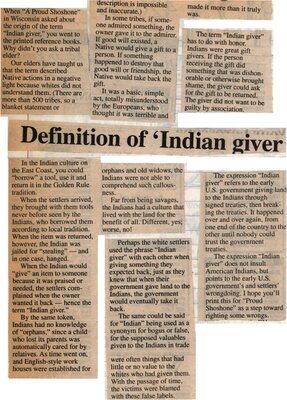"Definition of 'Indian Giver'"
- Full Text
When "A Proud Shoshone" in Wisconsin asked about the origin of the term "Indian giver," you went to the printed reference books. Why didn't you ask a tribal elder?
Our elders have taught us that the term described Native actions in a negative light because whites did not understand them. (There are more than 500 tribes, so a blanket statement or description is impossible and inaccurate.)
In some tribes, if someone admired something, the owner gave it to the admirer. If good will existed, a Native would give a gift to a person. If something happened to destroy that good will or friendship, the Native would take back the gift.
It was basic, simple act, totally misunderstood by the Europeans, who thought it was terrible and made it more than it truly was.
The term "Indian giver" has to do with honor. Indians were great gift givers. If the person receiving the gift did something that was dishonorable or otherwise brought shame, the giver could ask for the gift to be returned. The giver did not want to be guilty by association.
In the Indian culture on the East Coast, you could "borrow" a tool, use it and return it in the Golden Rule tradition.
When the settlers arrived, they brought with them tools never before seen by the Indians, who borrowed them according to local tradition. When the item was returned, however, the Indian was jailed for "stealing" - and in one case, hanged.
When the Indian would "give" an item to someone because it was praised or needed or needed, the settlers complained when the owner wanted it back - hence the term "Indian giver."
By the same token, Indians had no knowledge of "orphans," since a child who lost its parents was automatically cared for by relatives. As time went on, and English-style work houses were established for orphans and old widows, the Indians were not able to comprehend such callousness.
Far from being savages, the Indians had a culture that lived with the land for the benefit of all. Different, yes; worse, no!
Perhaps the white settlers used the phrase "Indian giver" with each other when giving something they expected back, just as they knew that when their government gave land to the Indians, the government would eventually take it back.
The same could be said for "Indian" being used as a synonym for bogus or false, for the supposed valuables given to the Indians in trade were often things that had little or no value to the whites who had given them. With the passage of time, the victims were blamed with these false labels. The expression "Indian giver" refers to the early U.S. government giving land to the Indians through signed treaties, then breaking the treaties. It happened over and over again, from one end of the country to the other until nobody could trust the government treaties.
The expression "Indian giver" does not insult American Indians, but points to the early U.S. government's and settlers' wrongdoing. I hope you'll print this for "Proud Shoshone" as a step toward righting some wrongs.
- Media Type
- Newspaper
- Publication
- Item Types
- Articles
- Clippings
- Description
- "In the Indian culture on the East Coast, you could "borrow" a tool, use it and return it in the Golden Rule tradition."
- Subject(s)
- Local identifier
- SNPL003204v00d
- Collection
- Scrapbook 6
- Language of Item
- English
- Creative Commons licence
 [more details]
[more details]- Copyright Statement
- Copyright status unknown. Responsibility for determining the copyright status and any use rests exclusively with the user.
- Contact
- Six Nations Public LibraryEmail:info@snpl.ca
Website:
Agency street/mail address:1679 Chiefswood Rd
PO Box 149
Ohsweken, ON N0A 1M0
519-445-2954




